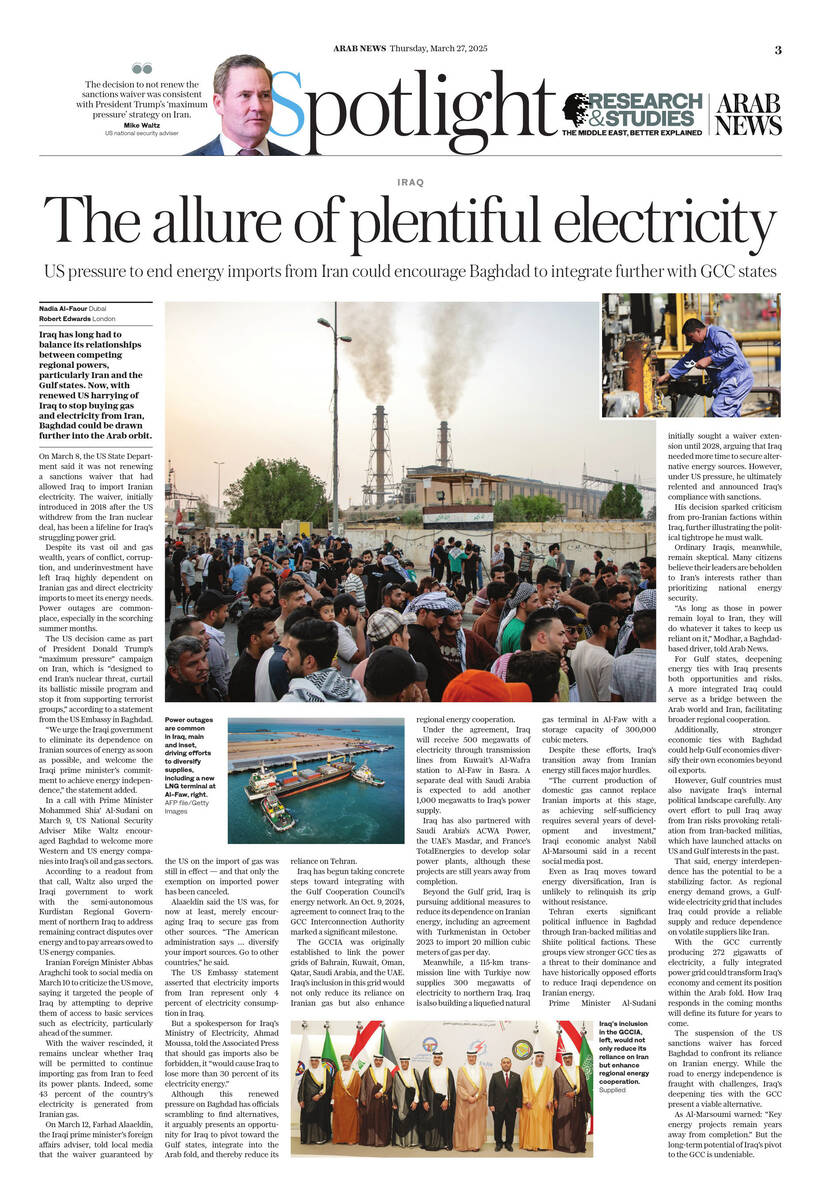DUBAI/LONDON: Iraq has long had to balance its relationships between competing regional powers, particularly Iran and the Gulf states. Now, with renewed US harrying of Iraq to stop buying gas and electricity from Iran, Baghdad could be drawn further into the Arab orbit.
On March 8, the US State Department said it was not renewing a sanctions waiver that had allowed Iraq to import Iranian electricity. The waiver, initially introduced in 2018 after the US withdrew from the Iran nuclear deal, has been a lifeline for Iraq’s struggling power grid.
Despite its vast oil and gas wealth, years of conflict, corruption, and underinvestment have left Iraq highly dependent on Iranian gas and direct electricity imports to meet its energy needs. Power outages are commonplace, especially in the scorching summer months.
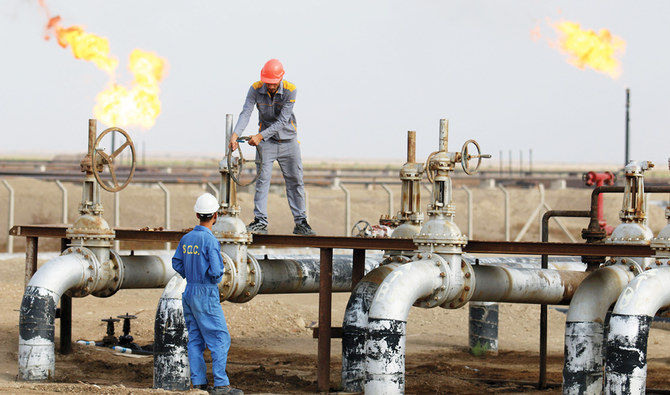
Iraqi laborers work at an oil refinery in the southern town Nassiriya. (AFP/File)
The US decision came as part of President Donald Trump’s “maximum pressure” campaign on Iran, which is “designed to end Iran’s nuclear threat, curtail its ballistic missile program and stop it from supporting terrorist groups,” according to a statement from the US Embassy in Baghdad.
“We urge the Iraqi government to eliminate its dependence on Iranian sources of energy as soon as possible, and welcome the Iraqi prime minister’s commitment to achieve energy independence,” the statement added.
In a call with Prime Minister Mohammed Shia’ Al-Sudani on March 9, US National Security Adviser Mike Waltz encouraged Baghdad to welcome more Western and US energy companies into Iraq’s oil and gas sectors.
According to a readout from that call, Waltz also urged the Iraqi government to work with the semi-autonomous Kurdistan Regional Government of northern Iraq to address remaining contract disputes over energy and to pay arrears owed to US energy companies.
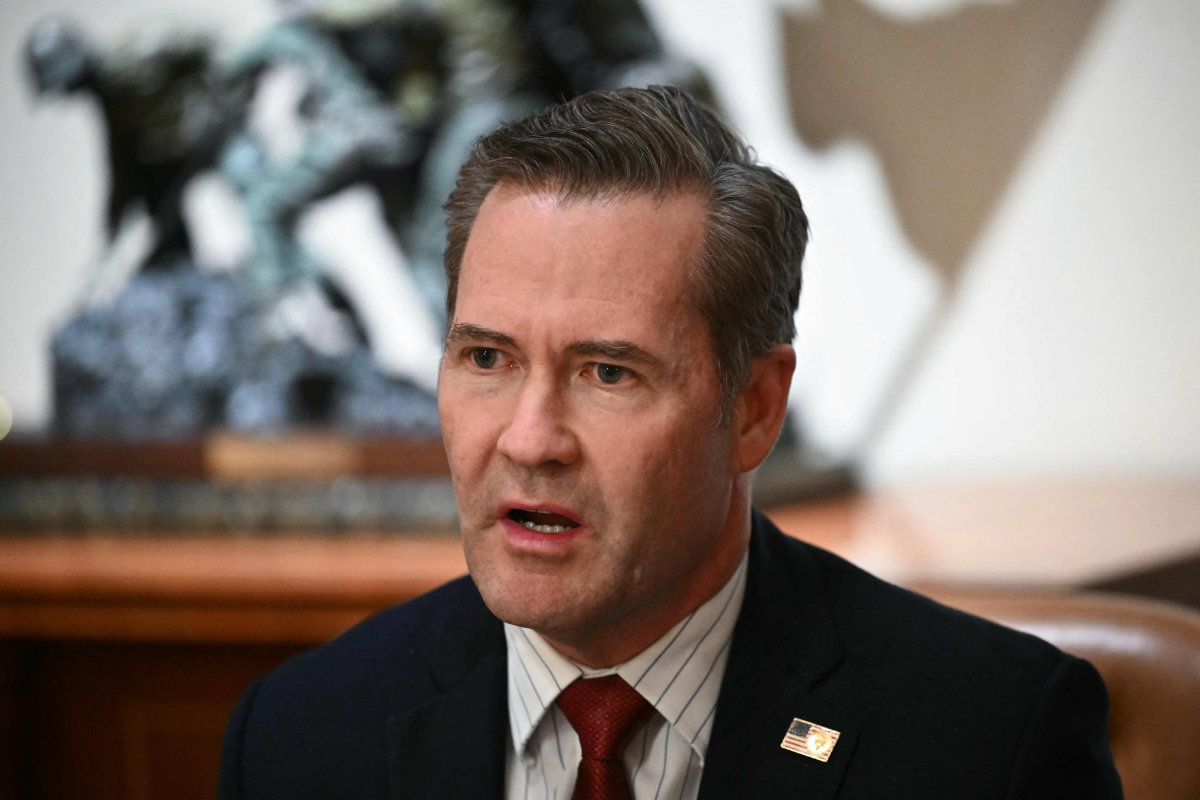
US National Security Adbviser Michael Waltz. (AFP)
Iranian Foreign Minister Abbas Araghchi took to social media on March 10 to criticize the US move, saying it targeted the people of Iraq by attempting to deprive them of access to basic services such as electricity, particularly ahead of the approaching summer months.
With the waiver rescinded, it remains unclear whether Iraq will be permitted to continue importing gas from Iran to feed its power plants. Indeed, some 43 percent of the country’s electricity is generated from Iranian gas.
On March 12, Farhad Alaaeldin, the Iraqi prime minister’s foreign affairs adviser, told a local TV channel that the waiver guaranteed by the US on the import of gas was still in effect — and that only the exemption on imported power has been canceled.
Alaaeldin said the US was, for now at least, merely encouraging Iraq to secure gas from other sources. “The American administration says … diversify your import sources. Go to other countries,” he said.
The US Embassy statement asserted that electricity imports from Iran represent only 4 percent of electricity consumption in Iraq.
But a spokesperson for Iraq’s Ministry of Electricity, Ahmad Moussa, told the Associated Press that should gas imports also be forbidden, it “would cause Iraq to lose more than 30 percent of its electricity energy.”
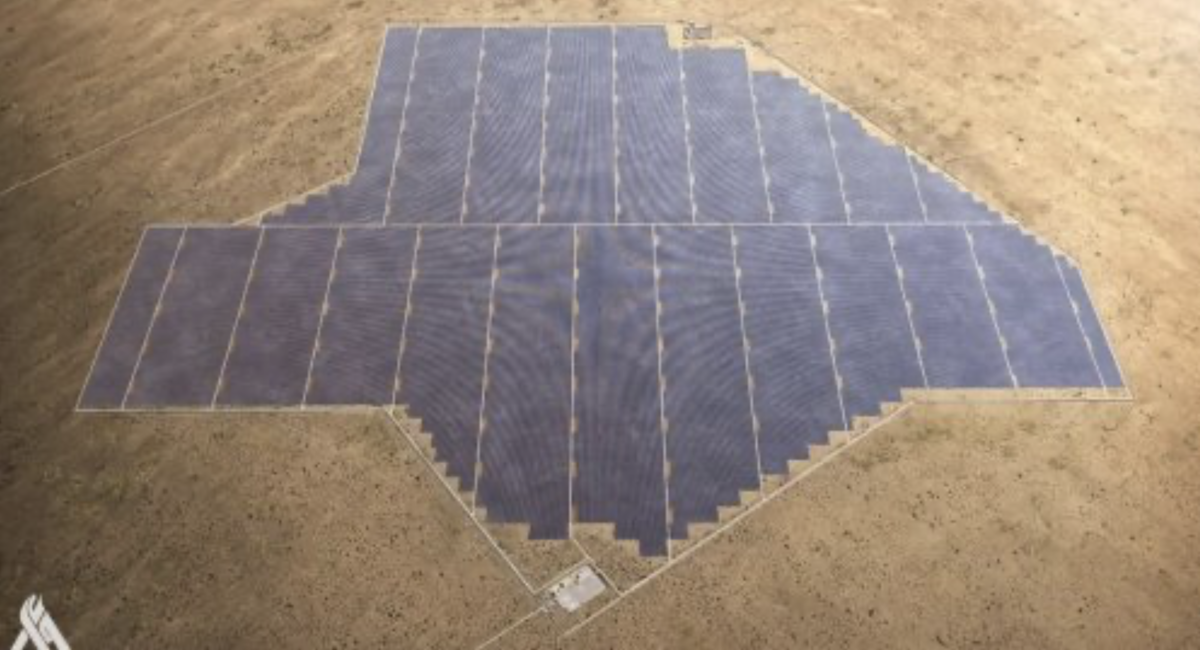
On March 6, 2025, Iraq's Ministry of Electricity launched Shams Basra, the country's largest solar energy project, in cooperation with Total Energies. (Iraqi News Agency photo)
Although this renewed pressure on Baghdad has officials scrambling to find alternatives, it arguably presents an opportunity for Iraq to pivot toward the Gulf states, integrate into the Arab fold, and thereby reduce its reliance on Tehran.
The question now is whether the Iraqi government will seize the moment to achieve energy independence or remain tethered to Iran’s energy infrastructure.
Achieving true energy independence will not be easy.
In 2022, Iran exported 3.5 terawatt hours of electricity to Iraq through four transmission lines. Iraq also imports up to 50 million cubic meters of gas per day from Iran. The neighbors signed a five-year extension to their gas export agreement in March 2024.
Talks on Iranian gas exports to Iraq began in the second half of 2010, shortly after the US military withdrawal following the 2003 invasion, leading to the signing of a supply agreement for Baghdad in July 2013. A contract for gas exports to Basra was signed in November 2015.
Iraq spends about $4 billion annually on Iranian energy, but US sanctions have delayed the country’s ability to make timely payments, leading to substantial debt accumulation, estimated at $11 billion.
To settle this debt, Iraq proposed an oil-for-gas deal in 2023, allowing it to repay Iran with crude. However it chooses to make these repayments, this significant debt burden poses a further challenge to severing links.
According to Iraq’s Parliamentary Oil, Gas and Natural Resources Committee, securing alternative sources of energy has proven difficult, with past diversification efforts delayed by bureaucracy and political resistance from Iran-backed factions in Baghdad.
Despite the challenges, Iraq has begun taking concrete steps toward integrating with the Gulf Cooperation Council’s energy network. An Oct. 9, 2024, agreement to connect Iraq to the GCC Interconnection Authority marked a significant milestone.
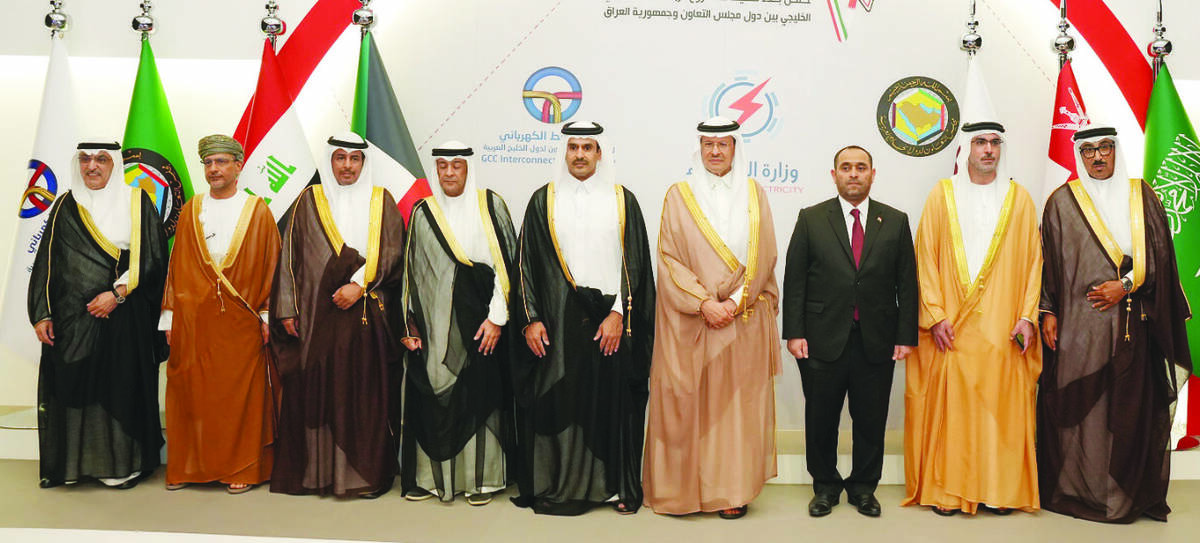
Iraq’s inclusion in the GCC Interconnection Authority would not only reduce its reliance on Iran but enhance regional energy cooperation. (Supplied)
The GCCIA was originally established to link the power grids of Bahrain, Kuwait, Oman, Qatar, Saudi Arabia, and the UAE. Iraq’s inclusion in this grid would not only reduce its reliance on Iranian gas but also enhance regional energy cooperation.
Under the agreement, Iraq will receive 500 megawatts of electricity through transmission lines from Kuwait’s Al-Wafra station to Al-Faw in Basra. A separate deal with Saudi Arabia is expected to add another 1,000 megawatts to Iraq’s power supply.
Given its own significant domestic energy challenges, including infrastructure problems and environmental factors such as droughts that have reduced its hydroelectric output, there is even a case to be made for Iran benefitting from integration into the broader GCCIA grid.
Elsewhere, Iraq has partnered with Saudi Arabia’s ACWA Power, the UAE’s Masdar, and France’s TotalEnergies to develop solar power plants, although these projects are still years away from completion.
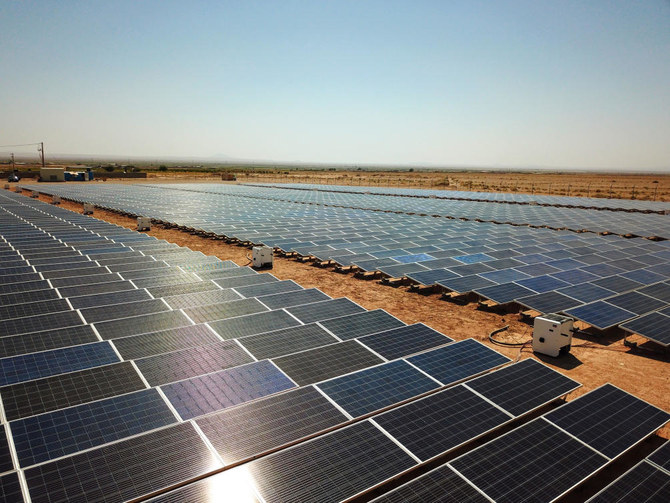
Iraq's solar power projects are still years away from completion. ((Shutterstock/file)
Beyond the Gulf grid, Iraq is pursuing additional measures to reduce its dependence on Iranian energy, including an agreement with Turkmenistan in October 2023 to import 20 million cubic meters of gas per day.
Meanwhile, a 115-km transmission line with Turkiye now supplies 300 megawatts of electricity to northern Iraq. Iraq is also building a liquefied natural gas terminal in Al-Faw with a storage capacity of 300,000 cubic meters.
Despite these efforts, Iraq’s transition away from Iranian energy still faces major hurdles.
“The current production of domestic gas cannot replace Iranian imports at this stage, as achieving self-sufficiency requires several years of development and investment,” Iraqi economic analyst Nabil Al-Marsoumi said in a recent social media post.
Even as Iraq moves toward energy diversification, Iran is unlikely to relinquish its grip without resistance.
Tehran exerts significant political influence in Baghdad through Iran-backed militias and Shiite political factions. These groups view stronger GCC ties as a threat to their dominance and have historically opposed efforts to reduce Iraqi dependence on Iranian energy.
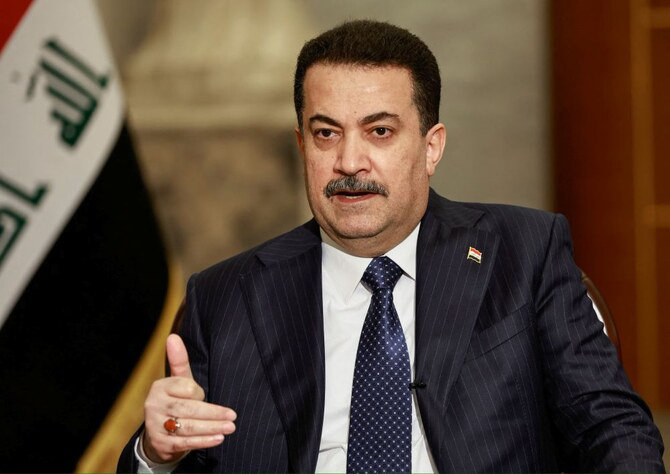
Iraq's Prime Minister Mohammed Shia’ Al-Sudani. (AFP)
Prime Minister Al-Sudani initially sought a waiver extension until 2028, arguing that Iraq needed more time to secure alternative energy sources. However, under US pressure, he ultimately relented and announced Iraq’s compliance with sanctions.
His decision sparked criticism from pro-Iranian factions within Iraq, further illustrating the political tightrope he must walk.
Ordinary Iraqis, meanwhile, remain skeptical. Many citizens believe their leaders are beholden to Iran’s interests rather than prioritizing national energy security.
“As long as those in power remain loyal to Iran, they will do whatever it takes to keep us reliant on it,” Modhar, a Baghdad-based driver, told Arab News.
For Gulf states, deepening energy ties with Iraq presents both opportunities and risks. A more integrated Iraq could serve as a bridge between the Arab world and Iran, facilitating broader regional cooperation.
Additionally, stronger economic ties with Baghdad could help Gulf economies diversify their own economies beyond oil exports.
However, Gulf countries must also navigate Iraq’s internal political landscape carefully. Any overt effort to pull Iraq away from Iran risks provoking retaliation from Iran-backed militias, which have launched attacks on US and Gulf interests in the past.
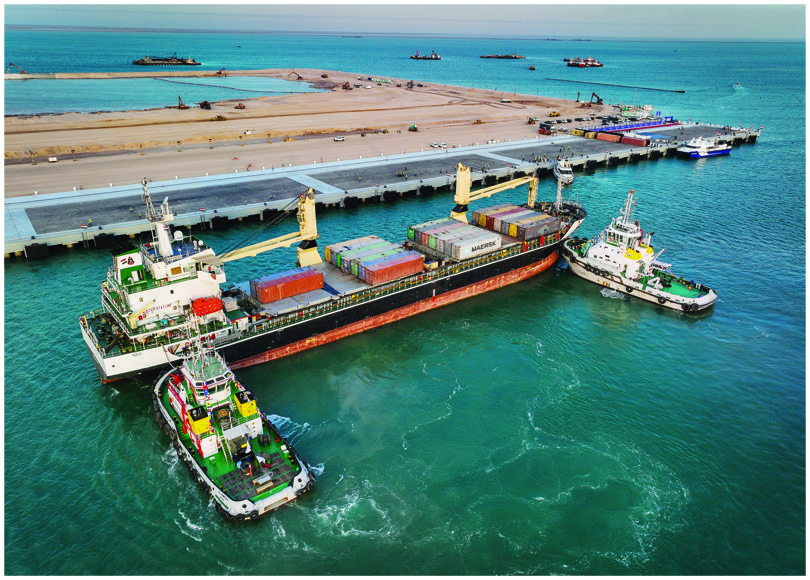
Iraq's new LNG terminal at Al-Faw. (Getty Images)
That said, energy interdependence has the potential to be a stabilizing factor. As regional energy demand grows, a Gulf-wide electricity grid that includes Iraq could provide a reliable supply and reduce dependence on volatile suppliers like Iran.
With the GCC currently producing 272 gigawatts of electricity, a fully integrated power grid could transform Iraq’s economy and cement its position within the Arab fold. How Iraq responds in the coming months will define its future for years to come.
The suspension of the US sanctions waiver has forced Baghdad to confront its reliance on Iranian energy. While the road to energy independence is fraught with challenges, Iraq’s deepening ties with the GCC present a viable alternative.
Whether Iraq can successfully integrate into the GCC’s energy network while balancing its relationship with Iran remains to be seen. However, if Baghdad seizes this historic opportunity, it could finally achieve the energy security and regional influence it has long sought.
As Al-Marsoumi warned: “Key energy projects remain years away from completion.” But the long-term potential of Iraq’s pivot to the GCC is undeniable.
The coming months will determine whether Iraq charts a new course toward the Arab world — or remains in Iran’s shadow.
